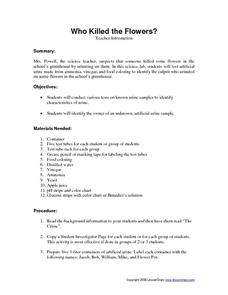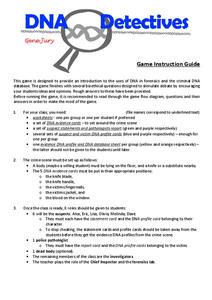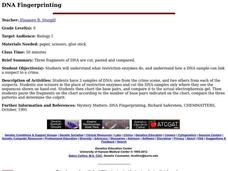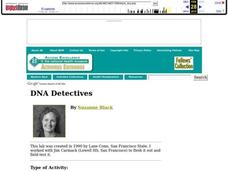Manitoba Education and Early Childhood Learning
Forensic Sciences: A Crime Scene Investigation Unit
Mr. Bergman has been murdered and we need you to solve the crime! The cross-curricular unit covers 11 different types of forensic science and includes 17 activities. Scholars perform blood type analysis, blood spatter analysis,...
Lesson Snips
Who Killed the Flowers?
This could be really good, or it could be really bad! The crime to be solved is, "Who went pee in the flowerpot?" Given four imitation urine samples, young chemists or crime scene investigators perform pH, glucose, and turbidity...
Curated OER
Who Did It?
Students explore how forensic science is used in criminal investigations. They learn that for the next few days that are going to try to solve a crime that took place in the classroom. Students are given a story to read about the crime...
Curated OER
Biographical Scene Investigators
Sixth graders become members of the BSI in this research simulation. They apply for Biographical Scene Investigator membership, investigate an individual, keep an evidence notebook and write an investigator's report.
Curated OER
Who Done It?
Pick and choose which activities to include in this crime scene investigation. Junior detectives can examine fingerprints, DNA, blood samples, or bone structure. The plan suggests you have teams solve a mystery, but it does not...
Gene Jury
DNA Detectives
Police find a man murdered in a local hotel, DNA everywhere, and now they need scholars' help. Budding detectives step into a crime scene playing the roles of victim, suspects, and investigators. They apply knowledge of criminology and...
Curated OER
Cardiac Arrest! Using Forensics to Investigate Cardiovascular Anatomy and Function
Students identify the different parts and functions of the cardiovascular system. In this forensics lesson, students collect and analyze evidence on a fictional crime. They describe different causes of cardiac arrest.
Curated OER
DNA Fingerprinting
Ninth graders investigate what restriction enzymes do, and explain how a DNA sample can link a suspect to a crime.
Curated OER
Blood Typing Investigation
Learners role-play a scenario in which a car crash patient is inadvertently given the wrong blood type during a transfusion. They perform blood typing and explore the genetics behind ABO and RH blood types using simulated blood.
Curated OER
Life Science: DNA Whodunit?
Students role play an honorary detective to assist in solving a crime committed. They investigate by a bank robbery and interview eyewitnesses using their Crime Investigation Notebook and clues from an eyewitness account from the...
Intel
Forensics: Get a Clue
Although the methods are all scientific, forensic science was started by police officers rather than scientists, who relied on observation and common sense. Young detectives use many tools to solve crimes around the school in a...
Curated OER
DNA Detectives
In order to understand DNA fingerprinting, advanced biology aces divise a crime scenario and analyze three different samples of lambda DNA. This creative lesson plan provides practice with micropipettes, electrophoresis boxes, and other...
Curated OER
My Science Box: DNA Fingerprinting
Students identify DNA in a crime scenario. For this DNA lesson, students perform paper chromatography and compare it against the pens of various suspects.
Curated OER
Blood Analysis
Young scholars reconstruct a crime scene to produce the blood spatter pattern. In this forensic science lesson, students describe the events that lead to produce such patterns. They explain the importance of blood analysis in...
Curated OER
Steller Web Spinning Mystery
Students investigate what a system is in the scientific world. They watch a video of the Stellar seals of Alaska and develop clues as to why the seals are leaving. They discover through the clues they discover, how the components of the...
Curated OER
Forensic Examination of Artifacts: The Mystery of Meriwether Lewis' Death
Students role play the position of a scientist to gather information on Meriwether Lewis' death. They discover what he did after the famous expedition and how centuries affect the study of a body. They share their information with the...















